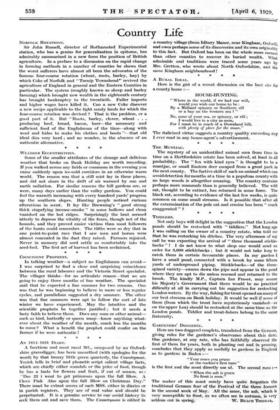Country Life
NORFOLK RcresTroxs.
Sir John Russell, director of Rothamsted Experimental station, who has a genius for generalization in epitome, has admirably summarized in a new form the position of British agriculture. In a preface to a discussion on the rapid change in farming methods in a number of counties he shows that the worst sufferers have almost all been the advocates of the famous four-course rotation (wheat, roots, barley, bay) by which Coke of Norfolk and "Turnip Townshend" revived the agriculture of England in general and the Eastern Counties in particular. The system (roughly known as sheep and barley farming) which brought new wealth in the eighteenth century has brought bankruptcy to the twentieth. Fuller imports and higher wages have killed it. Can a new Coke discover a new recipe applicable to the light sandy lands for which the four-course rotation was devised ? That is the problem, or a good part of it. But "Roots, barley, clover, wheat . . . producing beef, bread, bacon, beer—the necessary and sufficient food of the Englishman of the time—along with wool and hides to make his clothes and boots "—that old ideal dies very hard ; and no wonder, in the absence of an authentic alternative.
* * *






































 Previous page
Previous page